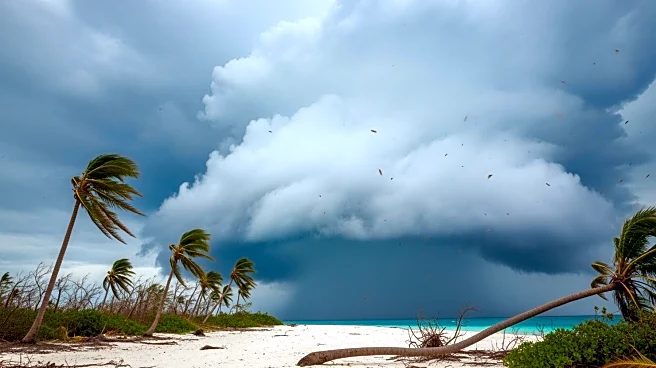What's Happening?
Hurricane Melissa, a Category 5 storm, has caused widespread destruction across Jamaica. The hurricane made landfall on the island's southwest coast, leading to severe flooding and damage to homes, businesses,
and community centers. Coastal communities, particularly fishing villages, have been hit hardest, with many structures flattened by the storm's powerful winds. The agricultural sector in St. Elizabeth Parish, known as Jamaica's breadbasket, has also suffered significant losses due to flooding. Satellite images reveal the extent of the damage, including inundated farmlands and stripped vegetation.
Why It's Important?
The devastation caused by Hurricane Melissa underscores the vulnerability of Caribbean nations to extreme weather events. The impact on Jamaica's infrastructure and economy is likely to be profound, affecting sectors such as agriculture and tourism. The storm's aftermath may necessitate substantial recovery efforts and international aid to rebuild affected areas. Additionally, the event highlights the importance of climate resilience and the need for improved disaster preparedness in the region. The damage to Jamaica's agricultural sector could have long-term implications for food security and economic stability.
What's Next?
Recovery efforts in Jamaica will focus on restoring essential services and infrastructure, with potential international assistance to support rebuilding efforts. The government may prioritize measures to enhance disaster preparedness and resilience, including investments in infrastructure and community education. The event may also prompt discussions on climate change adaptation strategies, emphasizing the need for comprehensive approaches to mitigate the impact of future storms. Regional cooperation and support from international partners will be crucial in addressing the challenges posed by Hurricane Melissa.
Beyond the Headlines
The hurricane's impact on Jamaica may have broader implications for regional economic stability and development. The disruption of local economies and infrastructure could affect trade and investment in the Caribbean. Additionally, the event may serve as a catalyst for increased international collaboration on climate change mitigation and adaptation strategies, highlighting the need for comprehensive approaches to address the challenges posed by extreme weather events.











